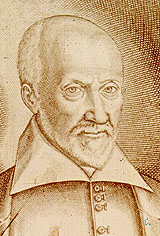Pierre Charron
French theologian and philosopher
Pierre Charron (1541 – 16 November 1603) was a French philosopher, and a close friend of Michel de Montaigne.


| This article about a philosopher is a stub. You can help out with Wikiquote by expanding it! |
Quotes
edit- Despair is like forward children, who, when you take away one of their playthings, throw the rest into the fire for madness. It grows angry with itself, turns its own executioner, and revenges its misfortunes on its own head.
- As quoted in Treasury of Thought : Forming an encyclopædia of quotation from ancient and modern authors (1894) edited by Maturin Murray Ballou, p. 123
De la sagesse (1601)
edit- Treatise on Wisdom (1601)
- The true science and study of man is man.
- Book I, Preface, as quoted in The Oxford Dictionary of Quotations (1999) by Elizabeth M. Knowles
- All Religions have this in common, that they are an outrage to common sense for they are pieced together out of a variety of elements, some of which seem so unworthy, sordid and at odds with man’s reason, that any strong and vigorous intelligence laughs at them; but others are so noble, illustrious, miraculous, and mysterious that the intellect can make no sense of them and finds them unpalatable. The human intellect is only capable of tackling mediocre subjects: it disdains petty subjects, and is startled by large ones. There is no reason to be surprised if it finds any religion hard to accept at first, for all are deficient in the mediocre and the commonplace, nor that it should require skill to induce belief. For the strong intellect laughs at religion, while the weak and superstitious mind marvels at it but is easily scandalized by it.
- Book II, Ch. 5, p. 345, as quoted in Atheism from the Reformation to the Enlightenment (1992) edited by Michael Cyril William Hunter and David Wootton, p. 99
Quotes about Charron
edit- His standpoint is invariably that of a human philosopher. The sceptic spirit which pervades the whole book allows it to be summed up in a very few words: by his own natural light and strength man is incapable of finding principles of religion and morality sufficiently certain; and, being sure of nothing, it is consequently wise to live as conveniently and pleasurably as the common usage of the people among whom one lives allows. No attempt is made anywhere in the body of the book to conceal the baldness of this doctrine.
- The Catholic Encyclopedia, on Charron's De la sagesse (1601).
- "All men," said a wise and good priest, "maintain that they hold and believe their religion (and all use the same jargon), not of man, nor of any creature, but of God. But to speak truly, without pretence or flattery, none of them do so; whatever they may say, religions are taught by human hands and means; take, for example, the way in which religions have been received by the world, the way in which they are still received every day by individuals; the nation, the country, the locality gives the religion; we belong to the religion of the place where we are born and brought up; we are baptised or circumcised, we are Christians, Jews, Mohametans before we know that we are men; we do not pick and choose our religion for see how ill the life and conduct agree with the religion, see for what slight and human causes men go against the teaching of their religion."—Charron, De la Sagesse.—It seems clear that the honest creed of the holy theologian of Condom would not have differed greatly from that of the Savoyard priest.
- Jean Jacques Rousseau, Emile, Book V The Creed of the Savoyard Priest Foxley translation